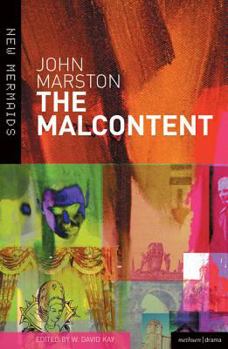The Malcontent
Select Format
Select Condition 
Book Overview
"This Malevole is one of the most prodigious affections that ever conversed with nature: a man, or rather a monster, more discontent than Lucifer."
The Malcontent is a striking example of the new satiric tone and moral seriousness in English comedy of the early 1600s. The play's vision of a fallen humanity driven by lust and ambition is created partly by its depiction of Machiavellian intrigue in the court of Genoa, and partly by the disaffected Malevole, the malcontent of the title, who is actually the deposed Duke Altofronto in disguise. Marston's tragi-comedy is full of reversals, surprises and moral transformations and offers a thin disguise for the Jacobean court and its vices. This new student edition contains a lengthy new Introduction with background on the author, date and sources, theme, critical interpretation and stage history.
Format:Paperback
Language:English
ISBN:0713642882
ISBN13:9780713642889
Release Date:June 2008
Publisher:Methuen Drama
Length:176 Pages
Weight:0.47 lbs.
Dimensions:0.4" x 5.2" x 7.8"
Customer Reviews
2 ratings
Good Reading - Betrayals and Unexpected Twists
Published by Thriftbooks.com User , 21 years ago
In 1601 John Marston, William Shakespeare, Ben Jonson, and George Chapman were described as "the best and chiefest of our modern writers". Today, only English majors are likely to be acquainted with John Marston's works. Even his most popular play, The Malcontent (1604), is seldom encountered. The Malcontent is often categorized as a revenge play, although it is quite unlike Thomas Kyd's The Spanish Tragedy, Shakespeare's Titus Andronicus, or The Revenger's Tragedy (uncertain authorship). Even though deceit, betrayal, disguises, and attempted murders are essential elements of the plot, The Malcontent lacks the brutality that characterizes other Elizabethan and Jacobean revenge plays. Unexpectedly, as the play develops, Malevole, the disguised Duke of Genoa, shows some willingness to forgive others for their past injustices. The recovery and restoration of character becomes more important than revenge. The Malcontent makes good reading. Cascading betrayals and unexpected twists maintained my interest throughout all five acts. Unlike many contemporaneous plays, the plot is not complicated by extraneous subplots. The action, although sometimes convoluted, is all tightly connected. All in all, I found the The Malcontent to be easier reading than most Elizabethan and Jacobean plays. Induction: Act I is preceded by an Induction by John Webster, a six page witty discussion among five of the Globe Theatre actors (including Richard Burbage) regarding the author's intentions and recent modifications to the play itself. Apparently, The Malcontent had been previously staged by a rival theatre, the Children of the Queen's Revels at Blackfriars. While of interest to scholars in unraveling the early history of Marston's play, this induction is not germane to the plot itself. Staging: In the introduction Bernard Harris, the editor of the New Mermaids edition, describes The Malcontent as "a theatrically ambitious and bewilderingly active play, rich in details of staging." Scenes require attendants, pages, lights, ladies, processions, music, dancing, costumes, jewelry, feasts, and even the devising of a masque.
A Fun Play!
Published by Thriftbooks.com User , 24 years ago
Malevole, the title character of Marston's masterpiece, has good reason to be a malcontent: he is the disguised, deposed rightful ruler of Genoa. The play is a collection of intrigues, questions as to who knows what about whom, and disguises. It is a great joy to read and one of my favorite pieces of Renaissance literature.The New Mermaid edition is very nice, with a good introduction, but the language has been modernized more than in most editions.






